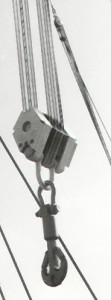 This week, a double gift for Christmas!
This week, a double gift for Christmas!
HORSE … a thick rope, extended in a perpendicular direction near the fore or after-side of a mast, for the purpose of hoisting or extending some sail thereon. When it is fixed before a mast, it is calculated for the use of a sail called the square-sail … When the horse is placed abaft or behind a mast, it is intended for the try-sail of a snow, and is accordingly very rarely fixed in this position, except in those sloops of war which occasionally assume the form of snows, in order to deceive the enemy.
SNOW, (senau, Fr.) is generally the largest of all two-masted vessels employed by Europeans, and the most convenient for navigation … When the sloops of war are rigged as snows, they are furnished with a horse, which answers the purpose of the try-sail-mast, the fore-part of the sail being attached by rings to the said horse, in different parts of its heighth.
– Wm. Falconer’s Dictionary of the Marine (1780).
 verjuice _ The sour juice of green or unripe grapes, crab apples, or other fruit, especially when made into an acidic liquor. This liquor was once much used in cooking, as a condiment, and for medicinal purposes.
verjuice _ The sour juice of green or unripe grapes, crab apples, or other fruit, especially when made into an acidic liquor. This liquor was once much used in cooking, as a condiment, and for medicinal purposes. by Dean King with John B. Hattendorf and J. Worth Estes.

 TACKLE, … a machine formed by the communication of a rope with an assemblage of blocks, and known in mechanics by the name of pulley.
TACKLE, … a machine formed by the communication of a rope with an assemblage of blocks, and known in mechanics by the name of pulley.